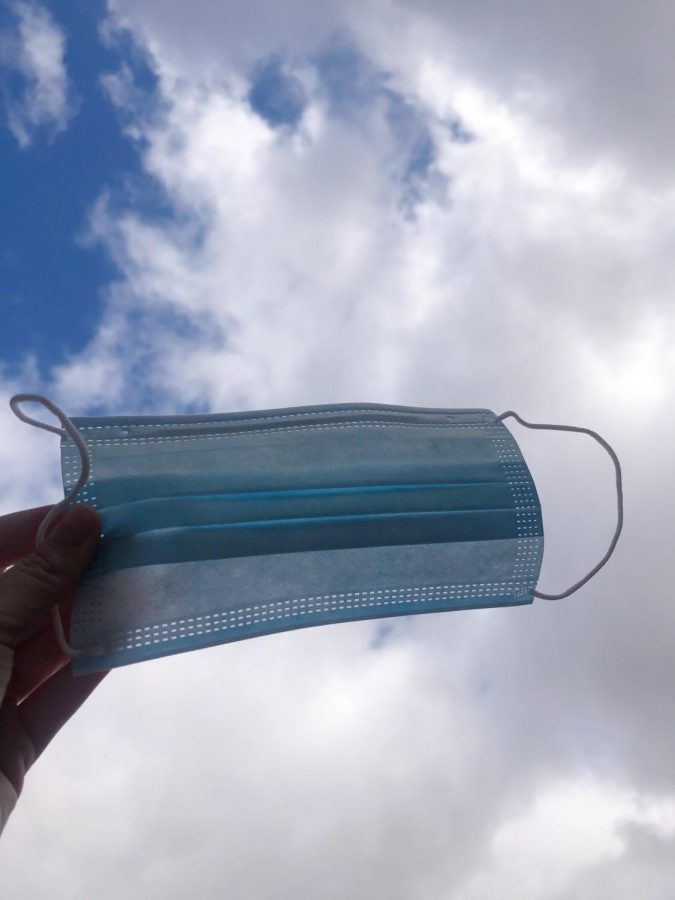Done with your mask?
The COVID-19 pandemic has reversed efforts to reduce single-use plastics and has created a new form of pollution: medical waste.
October 1, 2020
Many people are using disposable face masks right now, but most do not know what to do with the mask after. Because they are not being disposed of properly, this new form of pollution is causing wildlife and the environment to suffer. Not only are masks littering the beaches and oceans, but birds and marine life are also getting tangled in them. It is important to remember to cut the straps off of the masks and to dispose of them properly in the trash (they are not recyclable), to help solve the problem. As if the COVID-19 pandemic could not get any worse, welcome to the world’s next problem.
Although surgical masks, hand sanitizer bottles and latex gloves may be necessary to stop the spread of COVID-19, attention must be paid to their environmental impact. Disposable masks are plastic-based and water resistant, meaning after being discarded, they have a long after-life (roughly 450 years). Because they will remain in the environment for several years, they will continue to have negative effects far into the future. While masks have been seen here and there in the past, they have been spotted in a much higher abundance since the pandemic began earlier this year.
¨During a recent survey trip to Soko Islands, a small cluster of islands lying south-west of Lantau Island, Hong Kong-based environmental NGO OceansAsia found heaps of discarded single-use masks washed up on a 100-metre stretch of beach,¨ according to Earth.Org.
With each current the team spotted new deposits coming in, which are directly impacting the animals in that habitat who may mistake the trash for food. This could lead to the entanglement, choking, ingestion and death of those animals. For example, pictures have been spread over social media of a sea gull’s feet tangled in the ear-loops of a disposable face mask, which caused swelling to the point where the bird could no longer walk. This shows that single-use personal protective equipment is a threat to wildlife if not disposed of properly. Face masks must never be littered on the ground or set down outside as they can easily be blown away by the wind.
A French non-profit organization, Operation Mer Propre, which cleans the coast along the French Riviera, has voiced their concern of this recent environmental risk. The group’s founder, Laurent Lombard, posted a video on Facebook showing masks and gloves, mixed in with the usual plastic waste, littering the sea bed. Lombard believes that soon in the Mediterranean, there will be more masks than jellyfish.
¨These masks – we haven’t had them for long, and we’re going to have billions, so I say watch out, it’s the beginning of a new type of pollution,¨ said Lombard.
The group posts pictures on their Instagram account showing the COVID-19 related waste found on their dives, along with a caption that includes the plastic count. They hope that showing these images on social media will prompt people to swap disposable masks and latex gloves with reusable masks and more frequent hand washing.
¨With all the alternatives, plastic isn’t the solution to protect us from Covid. That’s the message,¨ says Joffrey Peltier, a member of Operation Mer Propre.
Efforts to avoid single-use plastics have been put on hold due to concerns about hygiene. In places like gas stations, for example, snacks such as muffins and sandwiches are now individually wrapped and cups for drinks can no longer be reused. Restaurants have also begun using disposable paper menus instead, and grocery stores are not allowing reusable bags. Before the pandemic began, an increasing number of cities and states were restricting the use of single-use disposable objects. California, Hawaii and Oregon had already banned plastic bags, and other states passed legislation to restrict the use as well. But, because of COVID-19, these policies have unfortunately been suspended. Progress to reduce plastic waste has been reversed and it is only a matter of time until the impacts begin to dramatically show.
It is crucial that governments step up and find solutions to combat the heavy use of plastics and to effectively manage medical waste treatment. Individuals also need to take responsibility by being aware of what to do with their face masks and other medical gear when discarding them. Cut the straps, throw them in a covered trash and reuse when possible, are a few ways to help protect the environment during these uncertain times.









